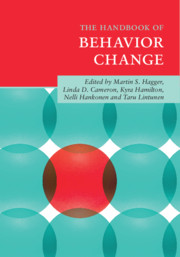Book contents
- The Handbook of Behavior Change
- The Handbook of Behavior Change
- Copyright page
- Dedication
- Contents
- Figures
- Tables
- Sidebars
- Contributors
- 1 Changing Behavior: A Theory- and Evidence-Based Approach
- Part I Theory and Behavior Change
- Part II Methods and Processes of Behavior Change: Intervention Development, Application, and Translation
- Part III Behavior Change Interventions: Practical Guides to Behavior Change
- 31 Attitudes and Persuasive Communication Interventions
- 32 Self-Efficacy Interventions
- 33 Imagery, Visualization, and Mental Simulation Interventions
- 34 Affect-Based Interventions
- 35 Autonomy-Supportive Interventions
- 36 Incentive-Based Interventions
- 37 Monitoring Interventions
- 38 Goal Setting Interventions
- 39 Planning and Implementation Intention Interventions
- 40 Self-Control Interventions
- 41 Habit Interventions
- 42 Economic and Behavioral Economic Approaches to Behavior Change
- 43 Dyadic Behavior Change Interventions
- 44 Social Identity Interventions
- 45 Motivational Interviewing Interventions
- 46 The Science of Behavior Change: The Road Ahead
- Index
- References
40 - Self-Control Interventions
from Part III - Behavior Change Interventions: Practical Guides to Behavior Change
Published online by Cambridge University Press: 04 July 2020
- The Handbook of Behavior Change
- The Handbook of Behavior Change
- Copyright page
- Dedication
- Contents
- Figures
- Tables
- Sidebars
- Contributors
- 1 Changing Behavior: A Theory- and Evidence-Based Approach
- Part I Theory and Behavior Change
- Part II Methods and Processes of Behavior Change: Intervention Development, Application, and Translation
- Part III Behavior Change Interventions: Practical Guides to Behavior Change
- 31 Attitudes and Persuasive Communication Interventions
- 32 Self-Efficacy Interventions
- 33 Imagery, Visualization, and Mental Simulation Interventions
- 34 Affect-Based Interventions
- 35 Autonomy-Supportive Interventions
- 36 Incentive-Based Interventions
- 37 Monitoring Interventions
- 38 Goal Setting Interventions
- 39 Planning and Implementation Intention Interventions
- 40 Self-Control Interventions
- 41 Habit Interventions
- 42 Economic and Behavioral Economic Approaches to Behavior Change
- 43 Dyadic Behavior Change Interventions
- 44 Social Identity Interventions
- 45 Motivational Interviewing Interventions
- 46 The Science of Behavior Change: The Road Ahead
- Index
- References
Summary
Research has shown self-control to be an important factor in determining behavior and outcomes in multiple contexts (e.g., health, education, workplace, interpersonal relationships). Self-control requires effortful pursuit of distal goals in favor of more immediately rewarding, proximal goals, particularly when those goals conflict. Individuals with good self-control exhibit well-developed self-regulatory skills that help them manage these conflicts or avoid them altogether. Over time, such skills enable strategic automization of behaviors in service of distal goals. Although self-control is often viewed as “trait-like”, research has suggested that self-control can be incrementally improved. A prominent means to improve self-control is through self-control or inhibitory control training, which involves repeated engagement in tasks that require inhibition of prepotent responses. Repetition of behaviors to develop habits and training individuals on inhibitory control tasks have been shown to be effective in improving self-control. There is a need for more high-quality studies using ecologically valid behavioral measures and long-term follow-up to provide more robust evidence on self-control training interventions. Preliminary guidelines for self-control interventions suggest that practicing self-control for a specified period of time in a particular domain or self-control will improve self-control in other domains. However, research needs to develop protocols involving meaningful, engaging training tasks that are acceptable in “real-world” contexts.
Keywords
- Type
- Chapter
- Information
- The Handbook of Behavior Change , pp. 586 - 598Publisher: Cambridge University PressPrint publication year: 2020



